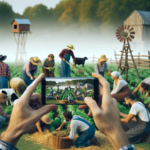Introduction to Online Agriculture Marketing
Did you know that the digital world has started to influence even the remotest sectors like rural marketing?
Yes, you heard it right!
Today, we are focusing on understanding the nuances of online marketing within the context of rural marketing.
We are looking at how internet marketing strategies are defined and exploring those unique challenges stemming from the rural environment. We will explain why online marketing holds importance in rural areas and outline some effective strategies.
We will share some success stories of rural marketing campaigns and list out helpful tools and platforms. Specifically, we are illustrating how these strategies are suited for agricultural businesses and their specific benefits.
Table of Contents
Understanding Online Marketing in Rural Marketing
Defining Online Marketing
Online marketing refers to the use of digital channels such as websites, social media, email, and search engines to promote products or services. It aims to reach a broader audience through targeted, data-driven strategies.
Challenges of Rural Marketing
Rural marketing involves promoting products and services in rural areas. These areas often face unique challenges such as:
- Lack of internet connectivity
- Limited awareness and education about technology
- Geographical spread making physical marketing difficult
Importance of Online Marketing in Rural Areas
Despite the challenges, online marketing can significantly benefit rural areas. Advantages include:
- Broader reach through digital platforms
- Cost-effective compared to traditional marketing
- Able to provide localized content to cater to specific community needs
Strategies for Effective Online Marketing in Rural Areas
| Strategy | Details |
|---|---|
| Localized Content | Creating content that speaks directly to rural communities, using local languages and addressing local issues. |
| Mobile Optimization | Ensuring websites and digital content are easily accessible on mobile devices, which are commonly used in rural areas. |
| Social Media Engagement | Utilizing platforms like Facebook, which are popular in rural areas, to engage and inform potential customers. |
| Educational Campaigns | Running campaigns to educate rural populations about the benefits and uses of products or services. |
Case Study: Successful Rural Marketing Campaigns
One successful example is the use of social media by the Indian dairy cooperative, Amul. Amul has effectively used platforms like Facebook to engage with consumers in rural areas, sharing local success stories and promotions. For detailed analysis, you can check this comprehensive Forbes article discussing the potential of digital marketing in rural areas.
Tools and Platforms for Rural Online Marketing
Several tools can make online marketing more effective in rural areas:
- Facebook Ads: Targeted advertising that can focus on specific geographic areas
- WhatsApp: For group communications and updates
- Google My Business: For local searches and business visibility
- SMS Marketing: Direct approach, suitable for areas with limited internet access
By leveraging these tools, businesses can craft more effective strategies tailored to the unique needs and behaviors of rural consumers.
Adapting Digital Marketing to Agricultural Businesses
Intro to Agricultural Digital Marketing
Just like other industries, agricultural businesses can greatly benefit from online marketing. To sum it up, agricultural digital marketing is the practice of using online mediums to communicate information about farming products and services. This could range from crop seeds and fertilizers to mechanized farming equipment, farm management software, and various other products.
The Unique Scene of Rural & Agricultural Online Marketing
While the fundamental principles of online marketing remain the same, agricultural businesses have certain peculiarities:
- The audience may not be tech-savvy and could prefer simpler, more direct messaging.
- The product or service being marketed is often season-dependent, affecting buyer behavior and decision-making timelines.
- The geographical spread of the audience necessitates a broader yet more focused marketing scope.
Approaches for Successful Agricultural Online Marketing
Despite these unique factors, several methods can be particularly effective:
| Approach | Description |
|---|---|
| Remote Customer Support | Creating channels for remote customer support, like chatbots or email, can help overcome geographical barriers and provide immediate assistance. |
| Seasonal Marketing Campaigns | Timing marketing efforts according to planting and harvesting seasons can greatly increase engagement and sales. |
| Partnerships with Local Agribusinesses | Collaborating with local agribusinesses can provide mutually beneficial exposure and lend increased credibility to your offerings. |
| Agri-Influencer Collaboration | Working with agricultural influencers can help foster trust with the rural audience and amplifies your marketing reach. |
Case Study: Agricultural Business Benefiting from Digital Marketing
John Deere, a leading tractor and farming machinery manufacturer, has extensively used online marketing to connect with farmers. They utilize their website to offer solutions, product details, and even provide online financing options for purchases.
They also engage actively on social media, posting relevant content related to farming best practices, product usage tips, and more. This optimized digital presence has allowed them to reach a broader audience and solidify their position in the market. For more information, read this in-depth SmartInsights article on the subject.
Innovative Tools for Agricultural Digital Marketing
Agribusinesses can take advantage of agricultural-specific digital marketing tools such as:
- Agrivi: An agricultural management software that offers marketing and sales modules.
- Farmlogs: A tool that helps farmers manage their operations, which can also be used for marketing purposes.
- Agworld: An agricultural platform that syncs with other business tools for marketing analytics and planning.
Proper utilization of these tools can provide an edge to agricultural businesses in digital marketing, helping them reach a wider audience and increase sales.
What are the Advantages of E-Marketing in Agriculture?
Amplified Reach and Accessibility
E-marketing allows agricultural businesses to transcend geographical boundaries, reaching a global audience. This means that a small farm in Kansas can attract buyers from other states or even other countries. Promotional activities, product updates, and other essential communications can be seamlessly distributed to a broader demographic via the internet.
Cost Efficiency
Online marketing is generally more cost-effective than traditional marketing methods. Creating a website, running social media campaigns, or distributing newsletters costs significantly less than physical billboard ads or print media. This cost efficiency means that small-scale farmers can compete with larger agribusinesses by putting their limited marketing budgets to effective use.
Data-Driven Decision Making
Digital platforms provide robust analytics that can help agricultural businesses make informed decisions. By analyzing metrics such as click-through rates, engagement levels, and conversion ratios, businesses can refine their strategies for maximum impact. This level of detailed insight is often missing in traditional marketing methods.
| Advantage | Description |
|---|---|
| Targeted Advertising | Use data to focus on specific demographics like young farmers or commercial growers, ensuring marketing messages reach the correct audience. |
| Real-Time Communication | Engagement platforms like social media and email provide instant communication channels, crucial for addressing customer concerns and feedback promptly. |
| Cost Savings | Digital marketing often costs less than traditional methods, making it accessible and affordable for smaller farms and agribusinesses. |
Enhanced Customer Engagement
E-marketing channels like social media and email allow for direct interaction with customers. This fosters a sense of community and trust, which can be particularly important in rural areas where word-of-mouth recommendations are influential. Engaging tutorials, videos, and blog posts can help educate and inform customers about new farming techniques, products, and innovations.
Streamlined Sales Process
E-commerce platforms enable agricultural businesses to streamline their sales process. By setting up an online store, businesses can allow customers to browse products, read reviews, and make purchases from their homes. This also simplifies inventory management and order tracking, reducing the time and effort spent on manual processes.
- Online Stores: E-commerce platforms facilitate convenient product selection and ordering processes.
- Automated Marketing: Tools like email automation can nurture leads and guide them through the purchasing process.
- Customer Relationship Management (CRM): Helps manage customer interactions, improving service quality and customer satisfaction.
Integration with Modern Technologies
Agricultural businesses can leverage modern technologies to further enhance their e-marketing efforts. For instance, integrating Internet of Things (IoT) devices can offer real-time updates on farming conditions that can be marketed to potential buyers. Similarly, the use of augmented reality (AR) and virtual reality (VR) can offer immersive experiences, such as virtual farm tours, enhancing customer engagement.
Incorporating these advanced technologies aligns with modern consumer expectations and can set agricultural businesses apart from their competitors. To explore more about how these technologies can be utilized in agriculture, check out this comprehensive article from Agriculture.com.
Conclusion: Harnessing the Power of Online Marketing in Agriculture
Online marketing offers numerous opportunities for agricultural businesses. From defying geographical boundaries to cater to rural customers, to utilizing targeted methods for maximum impact, it provides a cost-effective approach to reaching a broad audience. Furthermore, the inclusion of modern technologies like IoT, AR, and VR enhances the marketing authenticity and engagement.
In the face of unique rural marketing conditions and the peculiarities of the agricultural industry, online marketing adapts and thrives. By leveraging specific strategies such as providing localized content, optimizing for mobile use, and running educational campaigns, businesses can tap into the immense potential of rural markets.
Robust customer engagement, data-driven decisions, and streamlined sales operations underscore the effectiveness of this approach. The stage is set for a digital revolution in the agricultural industry—one where online marketing leads the charge!
Frequently Asked Questions – FAQs
Why is online marketing important in agriculture?
Online marketing enables agricultural businesses to reach a broader audience, regardless of geographical limitations. It is also cost-effective, allowing even small-scale farmers to compete with larger enterprises effectively. Moreover, it fosters better customer engagement and data-driven decision-making.
What are the challenges of rural marketing?
Rural marketing often faces hurdles such as limited internet connectivity, a lower level of technological awareness, and broad geographical spread that makes physical marketing challenging.
What strategies can help improve online marketing in rural areas?
Strategies such as localized content creation, mobile optimization, social media engagement, and educational campaigns can prove effective. It’s also crucial to utilize tools such as Facebook Ads, WhatsApp, Google My Business, and SMS Marketing.
How can agricultural businesses benefit from online marketing?
Agricultural businesses can cut costs, reach a wider audience, and make data-driven marketing decisions by exploiting online marketing. Also, the flexibility offered by e-marketing channels allows for more direct interaction with customers, which cultivates trust and elevates brand reputation.
What unique approaches imitate successful agricultural online marketing?
Successful agricultural online marketing often involves strategies like remote customer support, seasonal marketing campaigns, partnerships with local agribusinesses, and agri-influencer collaborations. These tactics ensure a broader yet more focused marketing reach, in line with the unique setting of the agricultural industry.






